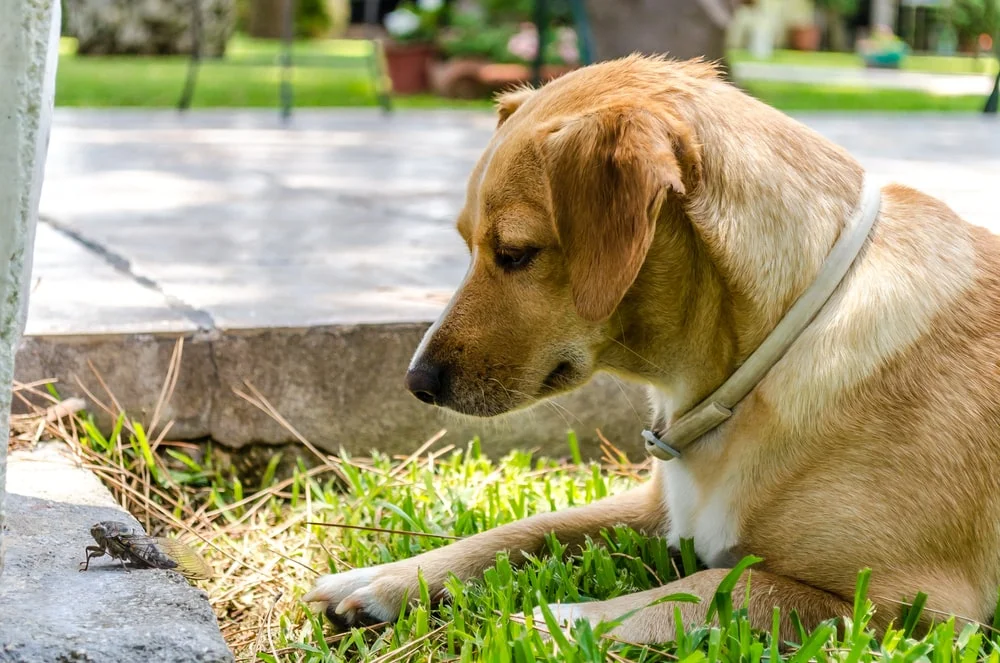While different types of cicadas emerge in the U.S. all the time, 2024 is likely to be a special year. In May or early June, large broods of periodical cicadas — potentially numbering in the trillions — are slated to appear across at least 17 states.1,2 This “cicadapocalyspe” marks the first time since 1803 that these two broods will co-emerge.2
The emergence of so many cicadas may mean dog parents need to be a little more vigilant in case their pup tries to gobble up these bugs. Eating too many cicadas could land a dog at the emergency vet with gastrointestinal challenges or other issues.3
MetLife Pet Insurance can help cover emergency vet costs if your dog eats too many cicadas. And with 0-day waiting periods on accidents, your coverage can start almost immediately.4 Get your free policy quote.
What’s This “Cicadapocalypse?”
Periodical cicadas fall into two groups — 13-year cicadas (emerging at 13-year intervals) and 17-year cicadas (emerging at 17-year intervals).1,2 The two broods emerging in 2024 will likely affect the following states:1
State |
Cicada Group |
13-year |
|
13-year |
|
13-year |
|
13-year and 17-year (Cicada-geddon!) |
|
13-year and 17-year (Cicada-geddon!) |
|
17-year |
|
13-year |
|
13-year |
|
13-year |
|
13-year |
|
13-year |
|
13-year |
|
13-year |
|
13-year |
|
13-year |
|
13-year |
|
17-year |
Can Dogs Eat Cicadas?
On one hand, if your dog eats a cicada or two, it may not be a big cause for concern. On the other hand, if your dog begins to eat large amounts of these bugs, they may develop various problems.3
It’s usually difficult for dogs to digest a cicada’s hard exoskeleton — a protective shell that cicadas shed as they grow. As a result, they may experience severe gastrointestinal (GI) problems like upset stomachs, bloody diarrhea, abdominal pain, and vomiting. Beyond the GI threat, they may also choke on the cicada’s exoskeleton or wings, suffer allergic reactions, and ingest dangerous amounts of insecticides.3
Does Your Dog Eat Things They Shouldn’t?
What To Do if Your Dog Eats Cicadas
Generally, pet owners shouldn’t panic right away if their buddies happen to scarf down a couple of cicadas.3 Still, if your dog begins to exhibit signs of GI distress after eating these critters, it may be a good idea to seek emergency veterinary care.
Treatment for GI Emergencies
When diagnosing a dog for potential GI issues, a vet may take blood tests, X-rays, ultrasounds, and urine tests.5 For treatment, they may recommend intravenous (IV) fluids, pain medications, anti-nausea drugs, and gastroprotectants — drugs used to treat stomach issues.3,6 Some dogs with vomiting and diarrhea may require hospitalization.7
On average, emergency vet bills for dogs can cost $150 – $5,000, depending on whether hospitalization is needed. If you have dog insurance from MetLife Pet, your policy may help cover these vet bills.
MetLife Pet Can Help if Your Dog Eats Cicadas
If you need to seek veterinary care after your dog eats cicadas, having pet insurance may prove helpful. MetLife Pet’s policies can help cover the costs of emergency care, as well as regular injury and illness vet visits. Our Preventive Care add-on may help cover your dog’s more routine veterinary costs, including yearly vaccines, dental cleanings, and flea and tick prevention.
With features like short waiting periods and an app with 24/7 vet chat,4,8 MetLife Pet Insurance can be a great way to protect your pup in case of emergencies or everyday needs. Don’t wait, get your free policy quote to see your personalized rates.
Help Your Pet Feel Better
855-270-7387


